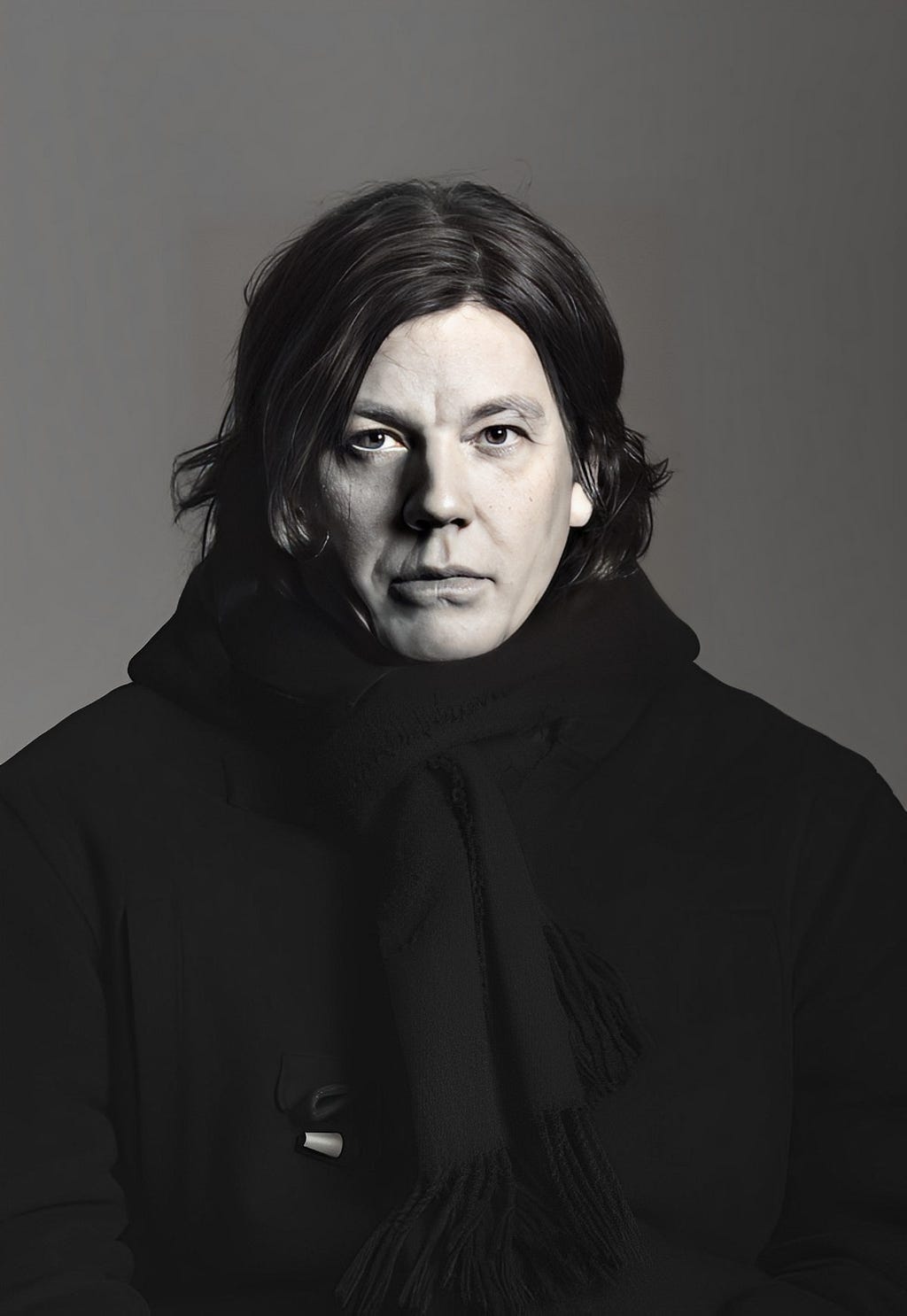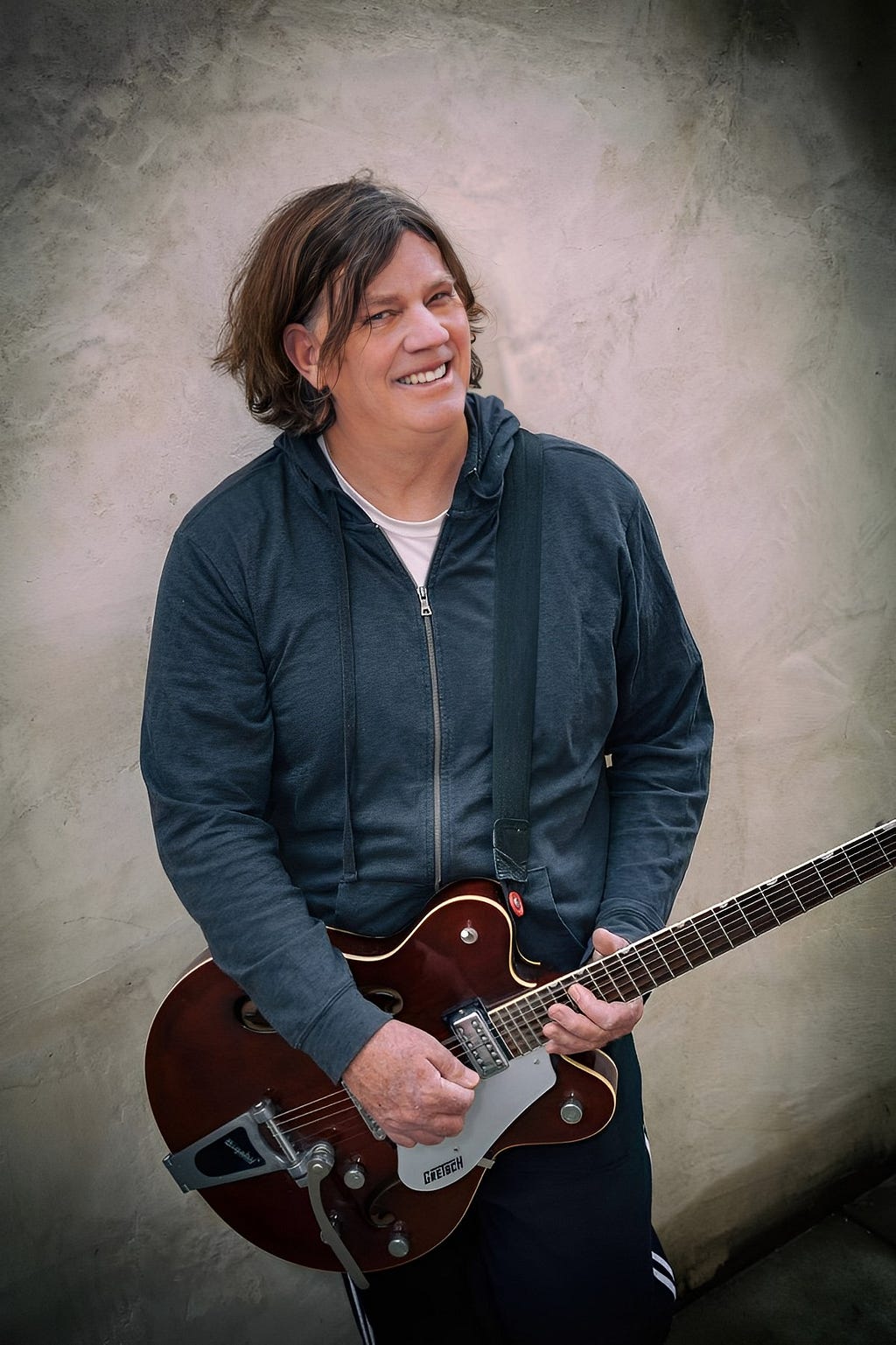
I wish someone would’ve told me early on that it wasn’t unacceptable for the artist to put his or her money into an imprint’s or label’s efforts to promote one’s work. We had a big radio hit on five or six stations and our label in the early Nineties just sat there rather than hiring a radio concern. They blew it completely.
As a part of our series about “5 Things I Wish Someone Told Me When I First Became An Artist” I had the pleasure of interviewing John Andrew Fredrick.
John Andrew Fredrick is the author of five novels and one book on the early films of Wes Anderson. He is the principal songwriter/singer of an indie rock back called the black watch that has released twenty-two albums to considerable acclaim. As Popmatters.com has observed, he is an accomplished painter. His poems have appeared in The Los Angeles Press, Santa Barbara Magazine, and Artillery, among others. He lives in Los Angeles and London.
Thank you so much for doing this with us! Can you tell us the story of how you grew up?
I grew up in Santa Barbara at an idyllic time for potential Peter Pans everywhere. We lived less than a mile from the beach; and my parents who adopted me (my brother Mark, eight years later, was a wonderful surprise) gave me all the private lessons I fancied and all the love I needed. The tough love too: when I was eleven I broke my leg so badly that I had to spend an entire year in bed; and my mum and dad did not let me watch more than an hour a day of television. So that’s, essentially, when I became an artist as I passed the lonely, bedridden time writing imitation Beatles songs and reading British history and lots of war stories. I used to joke with my students, when they failed to call me “Dr. Fredrick” or “John”: “Hey, you guys, I didn’t get a PhD and grow up walking the hardscrabble cobblestone streets of Montecito to my Fencing and French lessons to be called MISTER by you lot!” That got some laughs every time. Thing is, I also spent summers in Northern Iowa on family farms. So you’re talking a guy who knows how to milk horses and ride cows and deal with pigs and drown kittens here. A tough aesthete, in other words. And yeah my grandfather drowned a litter of kittens right in front of me, back of the farmhouse. A story my sweet parents always considered apocryphal — but it happened! Santa Barbara was a great place to grow up and an even better place to leave. My little town, really. I couldn’t go back for around a decade, it hurt so much to see how it was decidedly NOT my little town anymore. I spent so much time at the beach and on tennis courts there when I could’ve been learning Latin or Greek.
Can you share a story with us about what brought you to this specific career path?
Surely, the fact that my parents read to me constantly, plus the year in bed. But I’ll tell you this: after I finished my PhD in English I did what half the Lit PhDs do and started writing a novel. I got 400 pp. in before I realized — being a sort of Flaubert-imitator, spending days on two sentences and such — that I could reel off five songs in the time it took me to write one page of fiction. One night, kinda tipsy, I got up on stage and sang some U2 songs with a cover band that’d lost its front guy to irreversible drunkenness. No one laughed or heckled. I thought “Wow: I can do this!” The same week a London band called The Lucy Show (who were sort of Cure x Beatles) played Santa Barbara to seven people. I started my band, the black watch the very next day — inspired as all get-out. I met the guys in The Lucy Show twenty years later in London. Told them: “I started TBW because of you. Thanks for ruining my life! Haha.” Great chaps, Rob and Mark.
Can you tell us the most interesting story that happened to you since you began your career?
One rejection I got — and there are, for all of us scribblers, many to choose from — noted that, despite the fact that the very big publisher had turned down one of my novels, there was a reason, a bona fide purpose for me to be a writer, an artist. I think that that is the highest praise anyone legitimate can legitimately give — especially in the wake of living in an era where so so many pose, do art “projects” just to become rich and or famous. I never wanted to be rich or famous as a result of my work. Sincerely. And I have succeeded, I daresay, on both accounts. After the very first gig I did (yes, in a kilt) as the black watch, a quite renowned psychiatrist/music aficionado came up to me and said: ‘That band you played with, Toad the Wet Sprocket, are going to be stars; but you, John, you are going to be an artist. You already are.’ That meant the world to me, especially as I am sure I sang Olympianly out of tune, and I broke a string on the very first song. Einstein or Shaquille O’Neal or some genius like that said that perseverance (perspiration?) was half the whole of everything? Something like that. I have persevered, surely, proudly.
What are some of the most interesting or exciting projects you are working on now?
My son Chandler and I just got back from Austin, TX where we worked with an incredible producer from York called Misha Bullock who made a new record with the two of us. He drummed, played bass and keyboards and we did it all in five days. It’s called Weird Rooms and it might be the best the black watch record out of all twenty-two of them. Misha’s wife Sara is singing a bit on it as well so it was quite the family affair! And I have always maintained that Chandler is a better singer, player, and writer than I am — but kids these days just don’t LISTEN! He really is. And that was an unreal time recording. Up there with the records we’ve made with Scott Campbell, Rob Campanella, and Andy Creighton.
Who are some of the most interesting people you have interacted with? What was that like? Do you have any stories?
Well, Pat Fish of The Jazz Butcher was my brilliant friend in Northhampton for up till he died last year. Very much the raconteur and gent about town. An Oxonian and master songwriter. Weird how you become chums sometimes with your influences. George Saunders writes to me from time to time; I keep asking him to blurb one of my books and he’s very sweet about it — and ostensibly too busy. Cloris Leachman, at a dinner party once, asked me, upon learning that I fronted a rock band, to sing something for her guests a capella. Quite proud that I roundly DECLINED. Haha.
Where do you draw inspiration from? Can you share a story about that?
Sorry: I’d give away too many trade secrets in doing so. I will say that it’s imperative for an artist to READ widely and deeply. It boggles the very mind when you learn that an artist (usually a musical one) doesn’t read. How can you WRITE well without it?
How have you used your success to bring goodness to the world?
I hope I’ve inspired others to make something beautiful themselves, to make something out of nothing — which is what artists do. And here’s one of the things modern that I absolutely loathe: how everyone who knows he or she cannot do that, now wants to get in on Art itself by calling themselves “a creative.” I shudder.

What are your “5 things I wish someone told me when I first started” and why.
1 . I wish someone would’ve told me early on that it wasn’t unacceptable for the artist to put his or her money into an imprint’s or label’s efforts to promote one’s work. We had a big radio hit on five or six stations and our label in the early Nineties just sat there rather than hiring a radio concern. They blew it completely.
2 . That you should never date one of your bandmates. See also: The King of Good Intentions novels encore!
3 . That no matter how many accolades in the press you get it’s never enough. And however much money you make…well, money is tricky. I am thankful that I’ve ever made ANYTHING at all from my books and albums.
4 . I WAS told by a very successful and beautiful and brilliant Santa Barbaran (who was chums with a certain Springsteen) that the artist life was a very arduous one. But, natch, I ignored her — more fool me! Kidding. I wouldn’t trade this life for anything. Not even season tickets to the SF Giants.
5 . “It’s good oysters here,” The Pink Floyd
You are a person of great influence. If you could inspire a movement that would bring the most amount of good to the most amount of people, what would that be? You never know what your idea can trigger. 🙂
I would make second-language learning absolutely mandatory in primary schools. I try not to have regrets save the times I have hurt people’s feelings, but I do regret that my French and Spanish aren’t miles better. I have put so much into learning both and the payoff’s been, well, a bit humbling.
We have been blessed that some of the biggest names in Business, VC funding, Sports, and Entertainment read this column. Is there a person in the world, or in the US whom you would love to have a private breakfast or lunch with, and why? He or she just might see this.
George Saunders redux.
What is the best way our readers can follow you on social media?
www.facebook.com/john.a.fredrick
This was very inspiring. Thank you so much for joining us!
John Andrew Fredrick: 5 Things I Wish Someone Told Me When I First Became An Artist was originally published in Authority Magazine on Medium, where people are continuing the conversation by highlighting and responding to this story.
